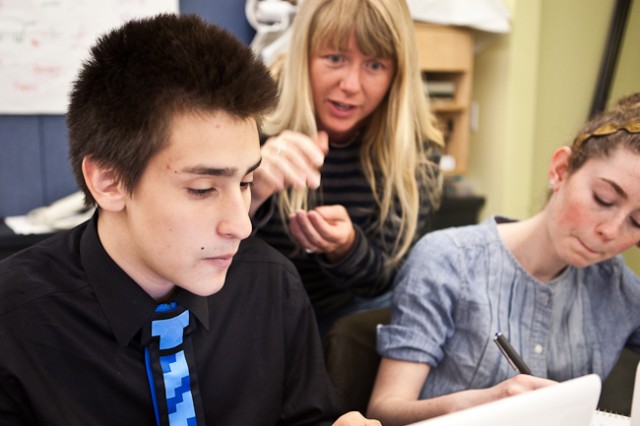By itself, this would be a valuable step. But scientific advances tell us that training teachers in techniques alone won’t be sufficient. Instead, they reveal that the personality traits of the teacher will matter more than the coaching methods or the curriculum.
Primarily, the interconnected nature of cognition is now visible. Whether titled interpersonal neurobiology or social neuroscience, leading edge science in the areas of positive emotions and neuroplasticity confirms that the emotional messages exchanged between people affect the physiological processes and biological structures of the brain and body. The embodied rapport between individuals causes shifts in neural networks, frontal lobe functioning, stress levels, even genetic expression. The recent emphasis on inducing a growth mindset in students, including a measurable shift in IQ, is a first step in understanding how the relationship between teacher and student is fundamental to performance.
This research is critical to understanding how inquiry-based teachers will need to engage students. In the coming system, attitude trumps rote learning. Whether students engage, persevere, and open their mind to novel solutions depends on their resiliency, grit, curiosity, creativity, and empathy. Psychologists refer to these as "personal assets," but they’re far more mysterious than a bank account, and they don’t originate in a textbook, so how do we teach them?
A first clue has been around for more than 20 years. Although overlooked as an inconvenient truth by industrial education, compelling evidence from the fields of adolescent development and resiliency studies show that caring relationships are the key factor in helping young people flourish—a term that encompasses the core attitudes necessary for successful inquiry and deeper learning. Now science has provided the missing link and observable evidence: Emotional interactions between teacher and student drive physiological changes, and thus performance.
This tells us that a teacher’s personality counts, but one additional new fact changes the game even further. Under the deficit model (one of the hidden assumptions of today’s system), the usual approach to emotions is to emphasize the limitations: How judgments and penalties diminish learning. But increasingly, social neuroscience is disruptive to this view. It appears that the connective powers of a relationship only manifest in the presence of sincere care. Love is expressed and conveyed emotionally and physiologically, with unconditional acceptance bestowing the greatest benefits.
The takeaway is humbling, but inescapable: If an inquiry-based system is to succeed, we’ll need human beings in the classroom who know their field, but who also radiate the kind of positive, non-judgmental love that helps students open their minds and hearts. That’s a tall order for most of us, and where it originates, we don’t know. But the foundation of sincere care will be essential, and it will manifest through the deep personality attributes of the teacher in a variety of ways in the classroom. Every teacher, for example, might reflect on the following:
Are you optimistic? Viewing the world as damaged or the future as bleak shuts down the brain by transmitting fear. Maintaining an optimistic attitude is an expression of love, inspiring curiosity and hope, and fostering emotional and physical health. Optimism is essential to teaching: Without hope, the reason to learn disappears.
Are you open? The world is being refreshed and powered by divergent thinking. Outcomes are unclear, even dangerous. But faith in the flexible thinking of the human mind can support young people as they sort out their new world and have the freedom to discover solutions not yet visible. An open attitude activates the frontal lobes, the place of flow and creativity.
Are you appreciative? Deep appreciation gives permission for failure, rather than penalizing for the "wrong" answer. It honors the stops and starts of human development. It conveys the ultimate message of a communal world: We are in this together.
Are you flexible? In inquiry, the journey matters as much as the destination. Constant reflection is a necessity to improving thinking and doing. Metacognition encourages wisdom, the ultimate goal of any worthy education system. Flexibility tells the brain and heart to keep working, keep going—you’re getting there.
Are you purposeful? Purpose binds teacher and student into the high-minded pursuit of solutions that matter. It is the reason that "authentic" education works and inauthentic education struggles. It tightens the connection between the learner and the teacher in ways that spur the natural creative impulse to change and improve the world.


